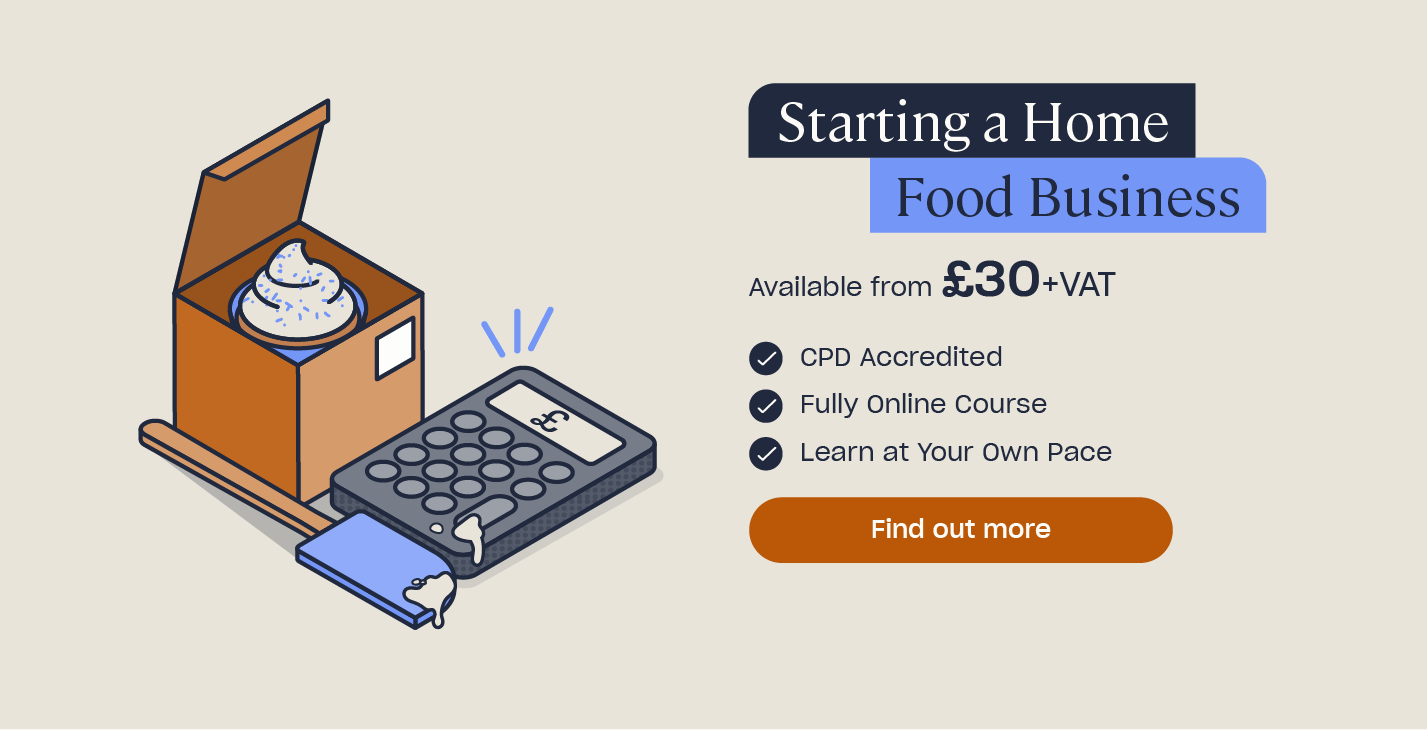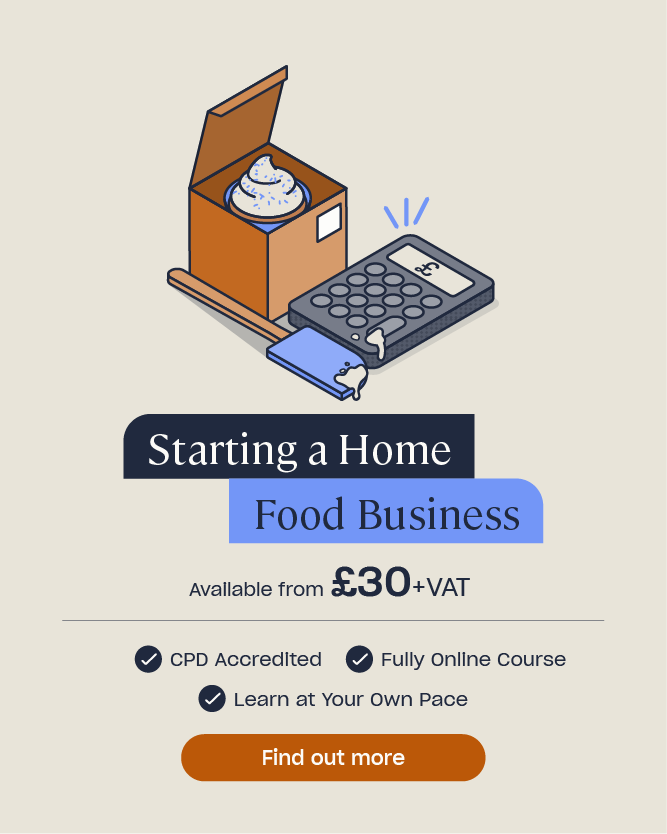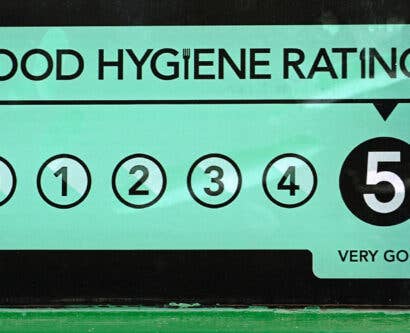How to Start a Bakery Business
Inspired by the return of shows such as The Great British Bake Off, home baking businesses have been booming in the UK – with reports showing there has been a 230% increase in recent years. If you have a passion for baking and fancy a new (or existing) career in a rewarding and creative industry, it might be time to consider looking into how to start a bakery business.
In this article, we will outline everything you need to know about starting a bakery business. We’ll look at the different types of bakeries, conducting market research, how to write your business plan and the legal requirements you need to be aware of.
- What is a Bakery Business?
- How to Write a Business Plan for a Bakery
- Legal Requirements for a Bakery Business
What is a Bakery Business?
A bakery business typically creates and sells food products that are baked in an oven. However, the scope for what you can create, and which products you choose to sell, is huge and only limited by your creativity and innovation.
Typical bakery goods include items such as:
- Bagels.
- Bread.
- Cakes.
- Cookies.
- Pastries.
- Pies.

There are many benefits to starting a bakery business, too. For example:
- Low start-up costs. The start-up cost of a bakery business can be as little or as much as you like. There are certain elements that you’ll need to have, but overall, the start-up costs are much lower than other businesses – especially if you choose to start the business from home.
- Creating your own working schedule. While you may need to work longer hours to begin with, once you’re established, you’ll be able to dictate when you want to work and which jobs you decide to take on. If you open your own cafe, for example, you’ll have the power to choose which hours it’ll be open to and from, and on which days of the week.
- The ability to be creative in your job. You’ll be in charge of choosing what you produce, how you do that and what it looks like.
- Diversification opportunities once the business takes off. Once you’ve established your bakery business, the opportunities to expand into further markets are endless.
Types of Bakeries
There are two main types of bakery businesses – retail and wholesale.
Retail bakeries are the most common type of bakery, and they have a number of different business models and niches for you to choose from. These include, but are not limited to, the following:
- Bakery cafe – This is a cafe that sells baked goods alongside other food and drink products – for example: coffee, tea, paninis, sandwiches, etc. There is also usually a place for customers to sit and eat their food.
- Bakery counter – Similarly to a bakery cafe, a counter may choose to only sell baked goods, or they may also offer other products, such as teas and coffees. However, this is typically a ‘take-away only’ space, and isn’t required to have a place for customers to dine in.
- Bakery food truck – This is a portable space to sell your baked goods from, and you may choose to drive to a number of locations or park yourself up in a designated space where customers will know to find you. Due to the lack of space, you may find it easier to create your baked goods at home rather than making them onsite.
- Home bakery – Selling directly from your home is a viable option for people who want to avoid the higher start-up costs of buying or leasing a separate premises to sell their baked goods from. You could also offer a delivery service for a set price to increase your profits. For inspiration, check out our article: ‘Ideas for Starting a Food Business from Home.’
In each of these business models, you also have the opportunity to specialise what you offer – for example, you may choose to only sell gluten-free products in your bakery food truck, open a café that specialises in French bakery goods only, or open a wedding cake business from your home.

On the other hand, wholesale bakeries don’t sell their products directly to customers. Instead, they sell to other businesses – for example to supermarkets, restaurants or cafes. Due to the nature of this business model, wholesale bakeries are expected to produce high volumes of their products if they want to be successful. This means there are much higher start-up costs involved, as you would need to have a large enough space to meet the demands of commercial orders, and potentially employ others to help you do this.
Need a Course?
Our Starting a Home Food Business course explains the fundamental steps you need to take in order to comply with the legal requirements and food safety regulations. It also covers how to write a business plan, conduct market research and ways to promote your business.
How to Write a Business Plan for a Bakery
Once you’ve decided that you’d like to start a bakery business, the first thing you need to do is conduct market research. This will help you to identify several key areas that are important to focus on if you want your business to be successful.
It will help to identify who your target audience is, what they are looking for, how often they want it, how much they are willing to pay for it and whether you will have any competition.
Things that you need to find out during the market research stage include:
- What kind of bakery are you going to open?
- How many different products will you offer?
- Which recipes will you use? Have they been tested?
- Who are your customers and what is their demographic?
- Will you sell your products online, in a shop or both?
- Are there any local events that you can sell your products at?
- Will you rent or buy premises outside your home? Where will this be?
- Will you have a delivery option? What are the costs and demand for this?
- Is there any existing competition? What do they offer?
- Do you need any insurance, certificates or licences to operate the business?

How to Write Your Business Plan
Every business needs a plan. The idea is that you write down, in one document, everything about the business to make your opportunity sound as attractive as possible to potential business partners and financial lenders. It also helps you to keep a focus on what your business objectives are so that you completely understand what you are aiming towards and how you are going to get there.
Writing a business plan doesn’t have to be a complicated job and it doesn’t have to be very long. As long as you get all the key information written down in a logical order, then your business plan is good to go.
Topics to include in your business plan are:
- The name, address and contact details of your business.
- Information on the management of the business; who’s in charge?
- Your company’s Mission Statement: in one sentence, summarise the aim of your bakery business.
- Where you will operate from; where is your office or kitchen, how big is it and what are the overhead costs involved?
- Your start-up costs; what equipment do you need to buy? Do you have any insurance or training to pay for?
- The everyday costs of the business; how much will you spend on ingredients and overhead costs on a weekly or monthly basis?
- Funding and financial projections; where do you plan to get the money from to start the business and what are your projected profits/losses for the next month, year, 2 years, etc? How will you maintain the cash-flow?
- Will you work on the business full-time or alongside your day job?
- Does your business have any competition and what are the features or benefits of your own business that will make it stand out?
- What is your marketing strategy?
- Do you have the logistics in place to deal with delivery, customer service, insurance, etc?
We’ve put together a simple template that you can use to get you started:
Equipment Needed for a Bakery
It’s vital that you have a well-equipped kitchen before you can open your bakery business – even if you’re planning to bake at home rather than in a commercial kitchen.
The type of equipment you’ll need will depend on whether or not you decide to specialise in one product, for example a wedding cake business. However, generally speaking, you’ll need:
- An oven – A convection oven is usually the type chosen by bakers as it provides dry heat and therefore cooks food evenly. However, if you’ve chosen to specialise in artisan bread, for example, you may prefer a deck oven.
- Space to prepare and knead your dough if you’re going to bake bread or pastries.
- Shelving and storage racks.
- A cart or trolley to move large bags of ingredients around – especially if you have a commercial kitchen to work in.
- Non-stick trays.
- A food mixer.
- Digital scales for accurate measuring.
- Cooling racks.
- Measuring spoons for accuracy of ingredients.
- Mixing bowls.

Legal Requirements for a Bakery Business
Once you have organised your business plan, it’s time to focus on making sure that your business will be legally compliant.
Selling food online without the proper registration or other legal requirements in place can have dire consequences not only for business owners, but for the health, safety and wellbeing of your customers.
Registering your Food Business
According to the Government, anyone who is regularly selling food must register as a food business through their local authority. On the Government website, you can input your postcode and this will direct you to where you need to apply. This licence is free to obtain, and cannot be refused.
However, you must register as a food business at least 28 days before trading. If you are already trading, you must register as soon as possible.
Trading without proper registration can result in a fine or prison sentence of up to two years.
You must also register with the Government as a sole trader in order to complete a self-assessment tax return each year. The Government classes anyone who is self-employed as a sole trader.
Food Hygiene Training
Once you have completed the necessary registration, you will receive a visit from the Environment Health Office (EHO) within 28 days of submitting your registration form. The EHO will ensure that you are compliant with all the relevant food hygiene legislation and are therefore safe to be trading.
During the inspection, EHO inspectors will assess three areas of your home food business:
- The physical condition of your premises. This means measuring your cleanliness, and whether you have suitable ventilation and pest control measures.
- Food hygiene. This involves ensuring that you and any employees have safe preparation methods, cooking and storage of food, and making sure you know how to safely cool or reheat your products.
- Food safety. This means inspecting the precautions you have in place for this, such as having a food safety management system implemented and used. HACCP (Hazard Analysis and Critical Control Point) is an example of this. You can find more information on HACCP in our article here.
Once they have completed their inspection, the EHO will issue you with a food hygiene rating. If you’d like to learn more about what to expect from an EHO visit, you can do so in our article, here.

Food safety is immensely important, and you must do everything in your power to ensure that you follow all the guidelines. By law, all food handlers must have an understanding of the basic principles of food hygiene and know how to protect the food they serve from contamination.
Need a Course?
Our Level 2 Food Hygiene and Safety for Catering training course is designed to help learners understand the basics of food hygiene so they can work safely, comply with the law, minimise contamination and ensure the food they handle is safe for consumers to eat. Our range of HACCP courses cover everything you need to implement an effective food safety management system.
Allergens
A vital part of food safety is having a sound knowledge of allergens. All food businesses have a duty to protect their customers from the risks allergens can present.
Any food has the ability to cause an allergic reaction, however, certain foods are more likely to cause a reaction than others.
There are 14 named food allergens which, by law, must be declared if they are used as an ingredient in a food product.
Conducting an allergen risk assessment is a key way to ensure you are complying with regulations. As you are legally required to provide allergenic information on your products, an allergen risk assessment may be the easiest way for you to identify where allergens occur in dishes, where the risks of cross contamination are and how you can best mitigate the risk. We have created a free, downloadable allergen risk assessment which you can find here.
We also have free and downloadable allergen labels for you to use. These are quick and easy ways to communicate allergens with your customers and reassure them that you are dedicated to food safety.

Food Labelling and Packaging
Food labelling is another crucial part of food safety. There are regulations regarding certain information that must be displayed on labels, and also specific allergen regulations for distance sellers. Distance selling is the indirect selling of products rather than directly to customers over a counter or face to face. Therefore, if you’re selling food online – via a Facebook or Instagram page, for example, you are a distance seller.
You must be able to provide allergen and intolerance information for your customers, especially with the introduction of Natasha’s Law, including any ‘may contain’ cross-contact allergens which you also handle. To find out more about precautionary allergen labelling, check out our article, here.
You’ll also have to decide what kind of packaging you’ll use in your bakery, and which materials it’ll be made from. For more information, check out our article: ‘What are the Different Types of Sustainable Food Packaging?’.
Food Allergen Awareness
Our Food Allergen Awareness training is designed to help food handlers identify and label allergens in order to ensure their customers remain safe from harm.
Health and Safety
There are a number of potential health and safety risks in a bakery, whether you are working from home or in a commercial kitchen. Being aware of these risks can help you to put control measures in place to prevent accidents or ill-health from occurring to yourself, or any workers you may employ.
The most common health and safety risks in a bakery include:
- Occupational dermatitis.
- Exposure to harmful substances.
- Slips, trips and falls.
- Manual handling.
- Appliances and machinery.

It is primarily an employer’s duty to ensure that health and safety measures are put in place. However, everyone that handles food has a part to play in adhering to, and upholding them so they remain effective.
There are numerous pieces of legislation that place legal duties on employers to protect the wellbeing of their employees. For example:
- The Health and Safety at Work, etc. Act 1974.
- The Management of Health and Safety at Work Regulations (1999).
- The Control of Substances Hazardous to Health Regulations (COSHH).
For more information, check out our article which contains a free, downloadable checklist: ‘Health and Safety in a Bakery’.
Health and Safety
Staff need to be sufficiently trained to handle occupational hazards, and it’s always helpful to improve their knowledge. Check out our range of Health and Safety courses which cover the fundamentals any bakery would need including Workplace First Aid and Control of Substances Hazardous to Health (COSHH).
We wish you all the best in your bakery business venture! If you have any further questions about the topics discussed in this article, don’t hesitate to get in touch with us at High Speed Training. You can contact our friendly team on 0333 006 7000 or email support@highspeedtraining.co.uk.
Further Resources
- Starting A Home Food Business
- 5 Key HACCP Considerations for the Bakery Industry
- Health and Safety in a Bakery: Free Checklist
- How to Start a Street Food or Food Truck Business
- How to Start a Cupcake Business
- How to Start a Food Business From Your Home
- Cake Decorations: Which Flowers are Edible?
- Selling Cakes from Home: Do I Need a Food Hygiene Certificate?
- Pest Control Quiz











